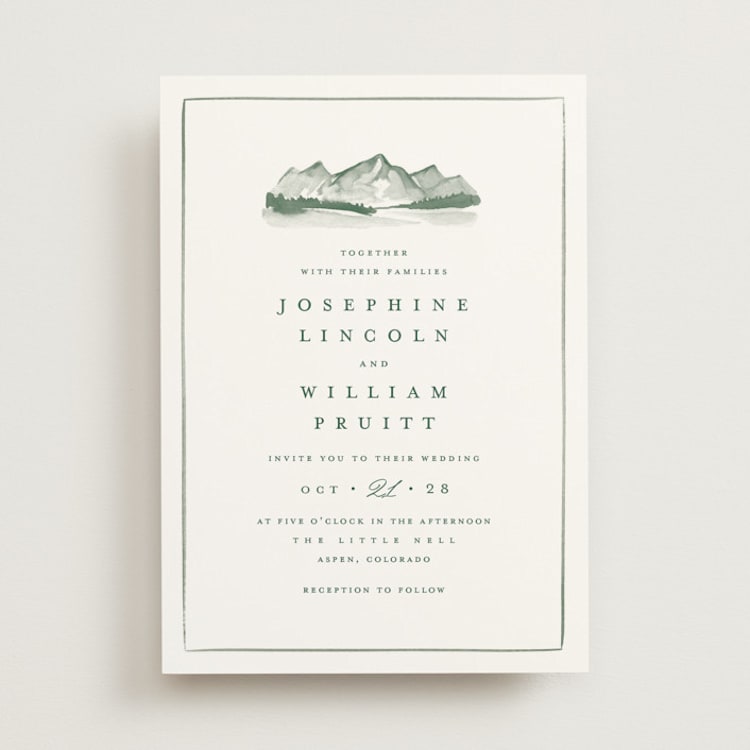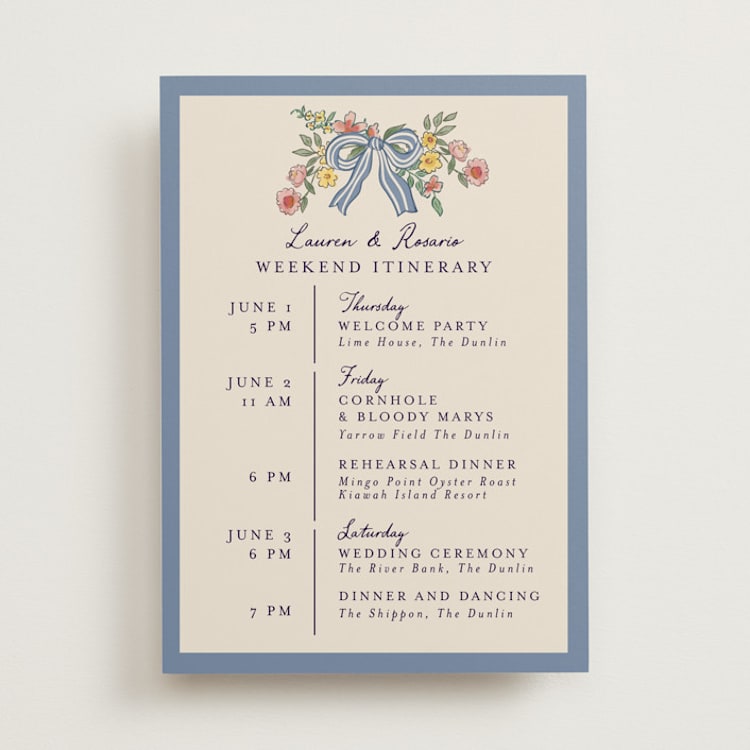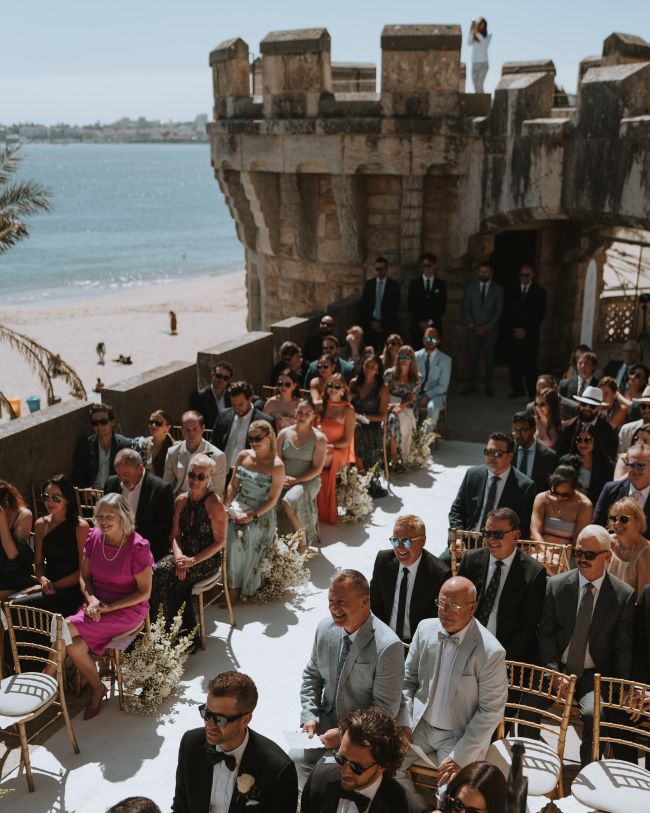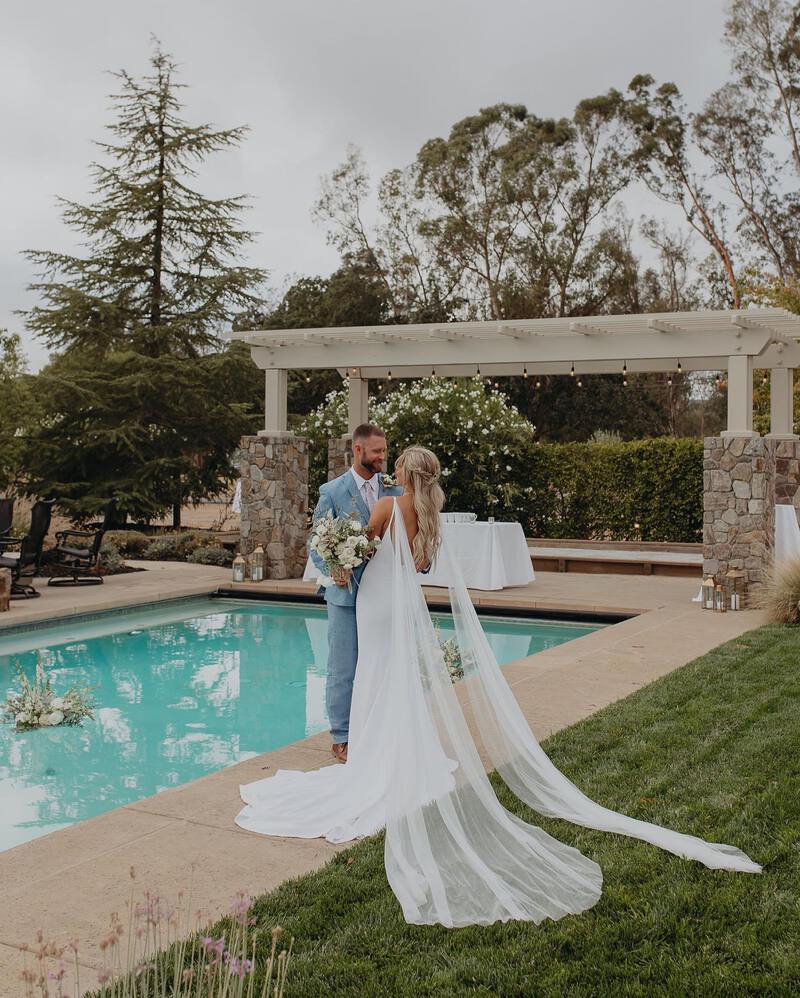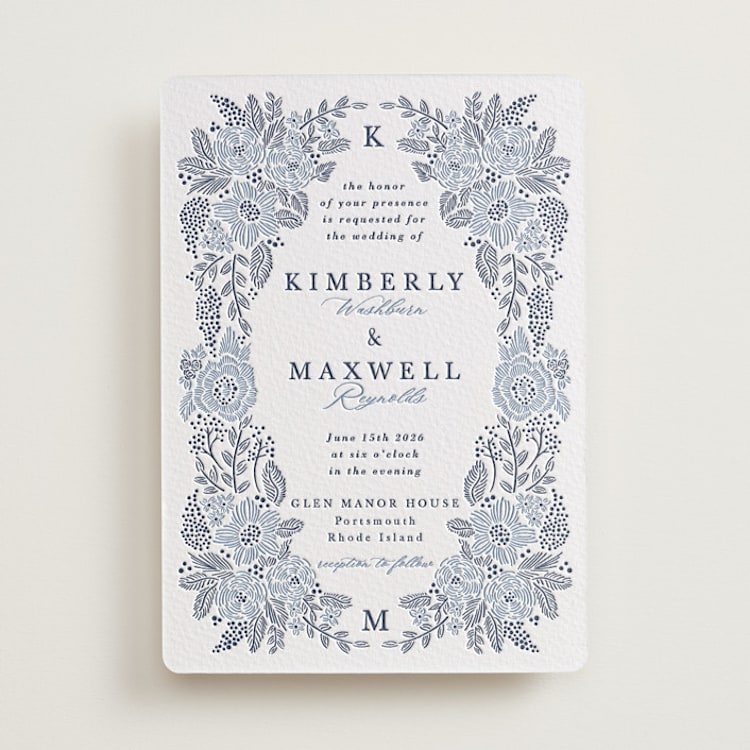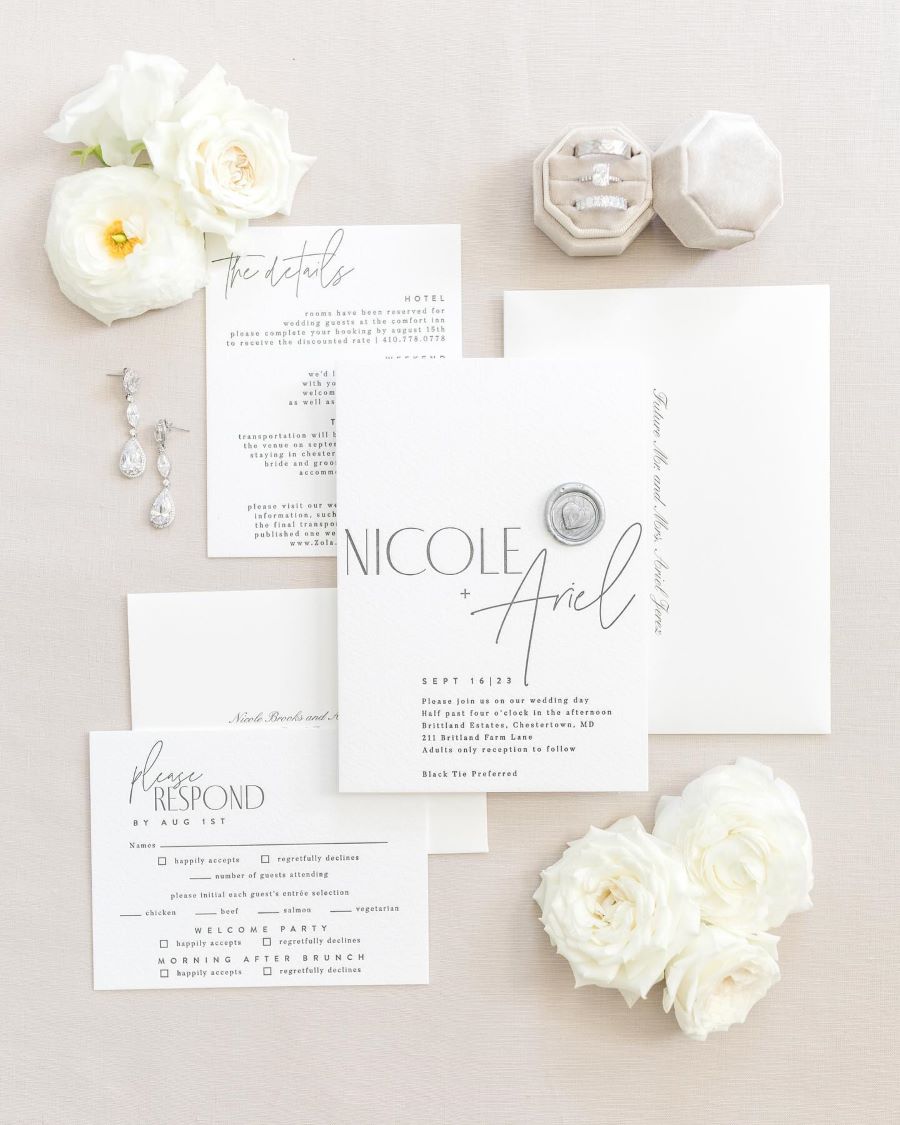Key Takeaways:
- When you choose the right destination, you set the stage for a wedding that truly reflects your style, fits your budget, and feels perfect for your guests.
- Feel confident and organized by following these 10 steps, making your destination wedding simple to plan and stress-free to enjoy.
- When you keep your guests informed and comfortable, you ensure they feel cared for and included, making your celebration a memorable experience for everyone.
Dreaming of a destination wedding on a tropical beach, a charming European villa, or the city where you and your partner first fell in love? A destination wedding lets you turn your big day into a once-in-a-lifetime adventure. You get to celebrate in a place that reflects your love story while creating lasting memories with your closest friends and family. But planning a destination wedding also comes with unique challenges, and you may wonder how to start making your vision a reality.
When planning a destination wedding, you’ll balance travel logistics, guest accommodations, legal requirements, and cultural considerations — all while keeping your budget in mind. The good news is that destination weddings are more accessible than ever, and with the right guidance, you can plan a seamless and joyful celebration. With a clear plan and the proper support, you can focus less on stress and more on enjoying every moment of your wedding journey.
Things to Consider when Planning a Destination Wedding: Pros & Cons
Destination weddings come with unique advantages and challenges, from travel logistics to the unforgettable memories they create. Before making any firm decisions, weighing the benefits against the potential hurdles is crucial.
If you’ve been picturing your vows somewhere magical, here’s what you should know to make the best choice for you and the people you love.
Pros
- Your special day becomes a trip of a lifetime. This is the biggest pro of a destination wedding! Your big day turns into something more of a big week of making memories with your family, friends, and spouse-to-be that will last a lifetime.
- They are a great way to keep the guest list small. If you want a more intimate ceremony, destination weddings can help you cut down your guest list without guilt. They are a great way to justify only inviting your nearest and dearest, as extended family you are not as close with aren’t as likely to travel for your ceremony.
- They can give you date flexibility. Want to host a tropical wedding in February? A Southern Hemisphere destination is right for you! The same goes if you live in the desert but want a dreamy mountaintop wedding.
Cons
- It can be harder to personalize your day. Many couples opt to host their ceremony and reception at a resort when going the destination wedding route. Doing so can help streamline planning for your big day immensely, but the all-inclusive nature of these venues can make it harder to add in those details that can help your wedding feel like you. Hiring a wedding planner and asking potential venues about personalization options can be a good way to avoid this hurdle if it is important to you.
- Destination weddings are not budget-friendly. Destination weddings can be more expensive than local weddings. The average destination wedding costs around $36,000–$41,000, while domestic weddings typically average about $33,000. This amount can increase or decrease based on what you want to feature at your ceremony. Keep costs down by only inviting your closest friends and family and hosting a memorable, intimate micro wedding.
- It is more expensive for your guests. On the flip side, destination weddings can be much more expensive for your guests to attend. This is especially true if your family and friends are already located in a central area — meaning everyone would need to travel to your ceremony, no matter what.
- Legality considerations. Every country has its own set of laws governing marriage and weddings. Be sure to do careful research on the legal considerations in your destination of choice as far in advance as possible. You may need to tie the knot officially at a local courthouse before you jet off for your ceremony.
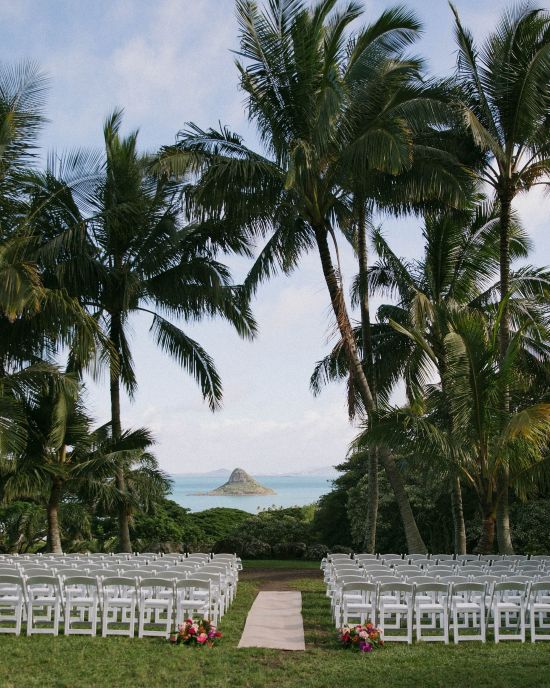
Photo by Sierra Lorriane Photography
How to Plan a Destination Wedding in 10 Steps
Planning a destination wedding can feel exciting but also overwhelming. You’re not just organizing one big day; you’re coordinating travel, accommodations, and events for your loved ones. These steps simplify the process and help you move from dreaming to doing.
Step 1: Choose a Location
The first step in planning a destination wedding is picking a location. Think back to your favorite vacation as a couple. What did you love about the area? Did the weather play a significant role? Did you love the people and the culture? Was the architecture inspiring? Is there a dream destination on your bucket list? Answers to all these questions should help steer you toward a wedding location. Before booking or choosing a venue, ask these must-ask wedding venue questions and review these wedding venue tips so you’re fully prepared.
Checklist for Choosing Your Location
- Visit before you commit. Seeing your venue in person reduces risk and reassures guests you’ve vetted the space.
- Understand passport and visa requirements. You’ll want to give guests plenty of notice and double-check your own documents are valid.
- Stay informed about travel advisories. Political shifts, weather events, or health considerations can all impact plans, so check official advisories regularly.
- Be mindful of major local events. Religious holidays, festivals, or sporting events can drive up costs and limit availability.
- Research seasonal weather. Share this info on your invitations so guests can pack accordingly.
- Plan for language barriers. If you or your guests don’t speak the local language, consider hiring translators or printing key phrases.
Top 5 Popular Wedding Destinations
- Beach Wedding Destinations. When you think of a destination wedding, a ceremony on a tropical island's white sandy shores probably comes to mind. For more budget-friendly beachside destinations, look to the Caribbean — Jamaica, the Bahamas, and Mexico’s Caribbean coast all offer affordable and all-inclusive options. The Hawaiian islands are perennially popular for couples looking for a domestic destination. At the same time, Bali and the coast of Thailand are great options for those who want to go somewhere further flung. (You can check out our full guide to planning a beach wedding for more useful tips if this is your venue of choice!)
- Mountain Wedding Destinations. Not many of us have the privilege of calling the mountains home, so if you’re looking to get married on a picturesque mountaintop, you’ll likely be planning a destination wedding. National and State Parks are great options for couples that want to host their wedding within the U.S. — places like Glacier National Park, Grand Teton National Park, and Olympic National Park are firm favorites. You can also host your wedding at a mountain top resort like Colorado's The Little Nell, or a chalet nestled in the Alps.
- Vineyard Wedding Destinations. Wine and weddings…need we say more? Vineyards make for a breathtaking destination, and are a great alternative to hosting your wedding at a resort, as they typically are well-equipped to host both the ceremony and reception. Napa is the obvious choice for couples looking to keep their wedding in the U.S, while Tuscany and Provence are great options for those looking to head to Europe to say “I do.” For an off-the-beaten-path destination, look for a venue in Mexico's Valle Guadalupe or the breathtaking South African winelands.
- Historic Property/Villa Wedding Destinations. If you and your spouse-to-be are architecture or history buffs, hosting your wedding at a historic property is a beautiful way to celebrate your bond. The options here are endless, so remember to ask yourself questions to help you decide which destination will best fit your dream day. Italy and France are great options if you hope to get married in a villa or sprawling chateau, while England, Scotland, and Germany are perfect for castle lovers.
- City Wedding Destinations. Hosting your destination in a world-class city like London or Paris is an epic way to turn your big day into a lifetime trip. Whether you’re choosing a domestic or an international destination, city weddings are a great choice if you’re hoping to put a personal spin on your ceremony and reception decor, as they’ll offer the biggest selection of vendors. Outside of Europe, Charleston, Miami, and Las Vegas are some of the most popular stateside city wedding destinations. Marrakech, Bangkok, and Rio De Janeiro are becoming more popular international destinations.
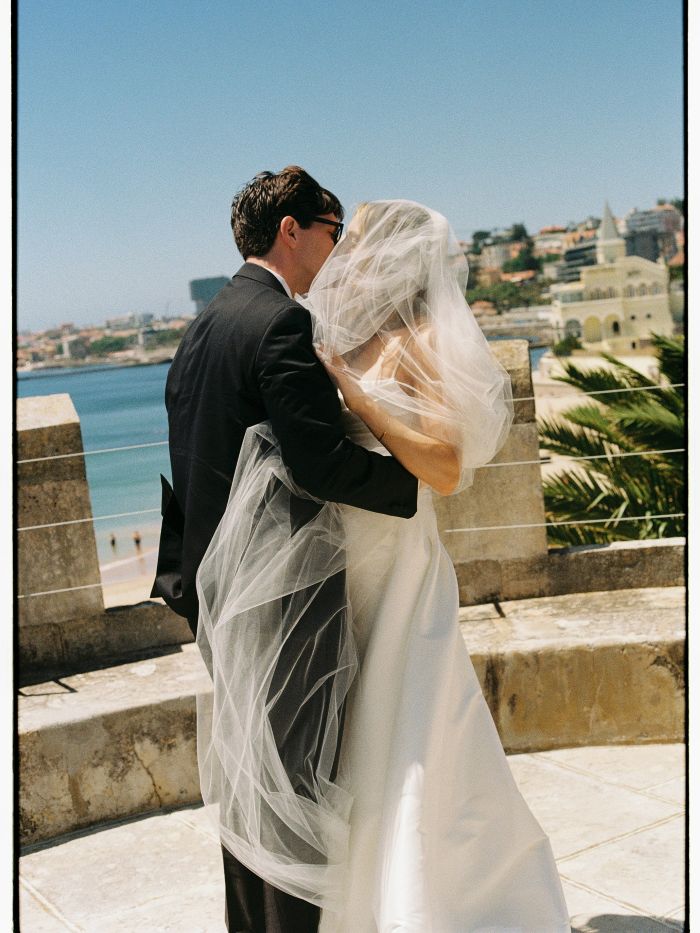
Photo by Mémorelle Weddings
Step 2: Set a budget
Once you’ve decided on the ideal location for your destination wedding, it’s time to set your budget. This is one of the most important steps to tackle early so you don’t overcommit before you have a clear sense of costs. Even if you’re working with a smaller budget, there are plenty of creative, affordable venues to explore. Consider using apps to track currency rates and expenses to stay on top of your spending.
For more detailed advice, check out our guide on how to piece together your wedding budget.
With your budget in place, you can begin to make smart planning decisions. One of the biggest choices will be whether to manage the details yourself or bring on a local wedding planner. Most experts agree that working with a planner familiar with the destination is often money well spent — they can connect you with reliable vendors, negotiate on your behalf, and help you avoid costly missteps. In many cases, their expertise pays for itself by saving you money overall.
Anticipating Your Wedding Size
At this stage, draw up a preliminary guest list to understand the scale of your celebration. Because guests must factor in travel, accommodations, and time off, expect a smaller turnout — typically 40% to 60% of invitees will attend. This can help you budget more accurately for food, drinks, and venue size.
Step 3: Find a knowledgeable wedding planner
Your wedding planner will be your go-to person throughout this process. A planner familiar with your destination can make everything run more smoothly and often help you save money in the long run. They’ll also be your boots-on-the-ground presence, crucial to keeping things stress-free when you can’t be there in person.
Choosing venues, caterers, and guest experiences can be overwhelming if you’re unfamiliar with your location. Do your research and look for a planner who has established close relationships with vendors, knows the best local activities, and can recommend great chefs. If you don’t speak the local language, their role becomes even more valuable — acting as your translator and liaison between you and your vendors.
Pro Tip: Prioritize planners with destination experience; ask about their local vendor network, remote coordination tools, and recent references. For more tips like this, check out our must ask questions when choosing a wedding planner guide!
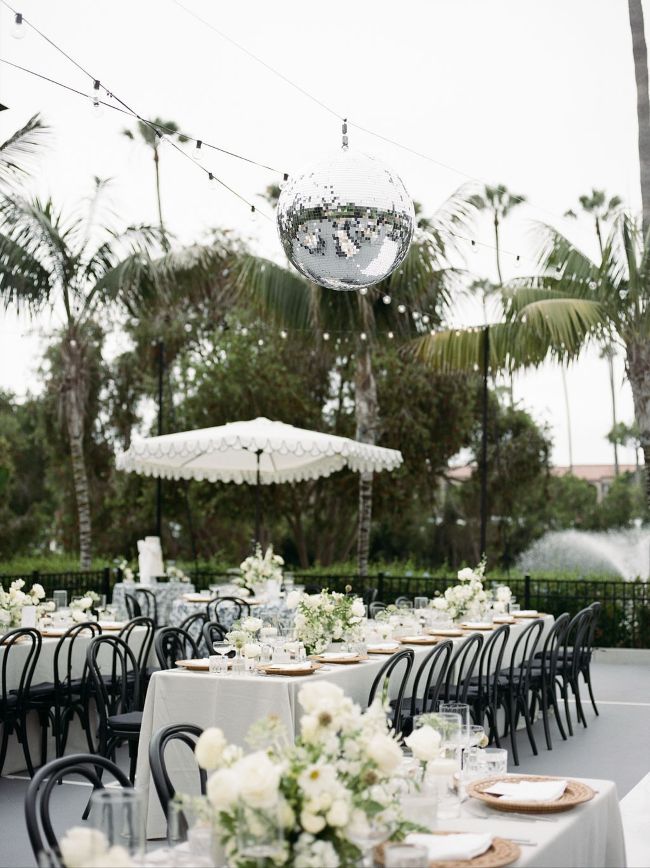
Photo by That Bliss
Step 4: Research how to make it official
Before you get too deep into planning, take time to understand the legal side of getting married abroad. Start by asking yourself:
- Will our ceremony be symbolic, or do we want it to be legally binding?
- Are we comfortable making it official with a simple courthouse ceremony at home if it's symbolic?
- What paperwork and timelines will we need to follow if it's legal?
Many couples choose to handle the legal paperwork in their city before traveling, then enjoy a symbolic destination celebration. If you go this route, complete the necessary marriage license applications and schedule any courthouse appointments in advance (requirements vary state by state, and you can explore them here).
If you want your marriage to be legally recognized in your destination country, prepare for extra steps. Some countries require residency before issuing a marriage license. For example, France asks for proof of living at a French address for at least 30 days before applying.
Step 5: Send Save the Dates early & keep guests informed
Be sure to send save the dates to guests as soon as you have confirmed your wedding location and date. Aim to send notice 9 months to a year before your event so your friends and family have ample time to plan. For inspiration, explore these unique save the date ideas.
It’s best practice to reference your wedding website on your save the date (you can check out some save the date wording examples in this guide). This way, guests can stay updated with lodging recommendations, travel checklists, and advice. Your wedding website should also remind them to review their legal documents, such as IDs and passports, well in advance. International travel may require additional paperwork beyond domestic guidelines, so keeping guests informed early will reduce stress.
Pro Tip: Set up a group chat or shared itinerary so guests can coordinate travel and feel connected. For loved ones who can’t attend, consider livestreaming the ceremony to ensure they can still participate in the celebration.
Your official wedding invitations can be sent 3 to 4 months before your wedding date. At this stage, assembling wedding invitations carefully ensures nothing is overlooked, and you can also use your wording to reiterate important travel requirements.
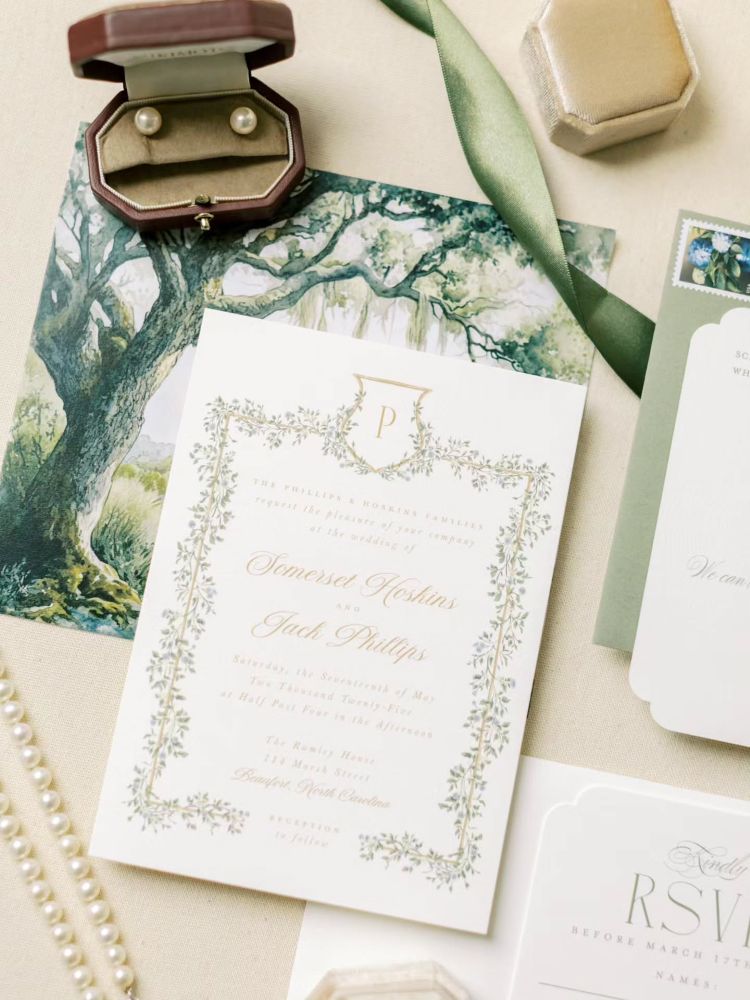
Photo by Ever Events & Design Co. Arbour Invitation by Leah Bisch
Step 6: Finalize Your Wedding Vendors
Once your venue is set, it’s time to secure your vendors. Booking early not only gives you the best options but also helps you avoid last-minute stress. Start with your venue’s preferred list if they have one, and then branch out to find professionals who fit your style and budget. For a smooth experience, use this wedding vendor questions guide to know exactly what to ask.
Here are a few key categories to prioritize:
- Photographers. Look for a local photographer who knows the best hidden spots for breathtaking shots. Consider scheduling a pre-wedding shoot at cultural landmarks to capture the spirit of your destination. Here’s a checklist of questions to ask your photographer.
- Music Entertainment. Decide whether you’ll curate your own wedding playlist, hire a local band, or book a DJ. Including regional music will delight your guests and create lasting memories. Use this checklist of questions to ask your wedding DJ or band.
- Florists. Choose a florist who understands popular wedding day florals and local blooms. They can help ensure your dream flowers are available or suggest beautiful alternatives.
- Caterers. Guests travel for more than just your vows — they want a taste of the destination! Collaborate with your caterer to include local flavors, desserts, or signature cocktails. A regional twist will make your menu unforgettable.
- Decor Rentals. If your venue isn’t all-inclusive, confirm what they provide and what you’ll need to source elsewhere, from basics like generators to statement pieces like tents, lighting, and table settings.
- Accessibility Tip: Confirm if your chosen venue is senior- and wheelchair-friendly, and communicate dietary needs with caterers early so all guests feel welcome and cared for.

Photo by Lane Parker Weddings
Step 7: Find Lodging Recommendations
Accommodations are one of the top concerns guests have about destination wedding planning. Guests will feel much more comfortable if they are sleeping at an establishment that is hosting additional members of your wedding group. (It will also be much more fun for everyone!)
Here are a few of our top tips for guest accommodations:
- Offer Options at Different Budgets. Although you are not responsible for covering all your guests’ accommodation costs, including a few options catering to different budgets is helpful. Look into the resorts, neighboring hotels, and B&Bs in close proximity to the wedding venue to allow your guests to book at a price point they are most comfortable with.
- Location is everything. Be sure to know how far the venue is from hotels and the airport. Cost savings are important, but staying at a location that is closer to your venue is worth the money. Having a hotel room nearby to rest between wedding events, to change into different outfits, and crash after a night of dancing is important. The last thing you and your guests want to do after a night of good food, drinks, and dancing is to make a long trek back to their accommodations.
- The wedding party should be encouraged to stay at the same location as the couple. This will help ensure that rehearsals and the ceremony go off without a hitch. This lodging recommendation is key to planning a destination wedding that will run smoothly. The last thing you want is for people to be scrambling around for rides to the venue!
- Think about transportation to and from your wedding events. Look into hotel services such as shuttles, rideshare services, and the overall walkability of the area, and add this information to your wedding website. A wedding planner who is familiar with the area will be able to give you suggestions about the best routes to take and the safest and most reliable car services to use.
- Talk to your vendors. Ask venues/hotels about room blocks, cutoff dates, and perks like welcome-bag delivery to make things easier for your guests.
Step 8: Plan Themed Day-of Decor
Your location, setting, food, flowers, and the surrounding culture will create an unforgettable backdrop. Still, thoughtful details can help carry your theme through every moment of the celebration. Consider how wedding signs, menus, favors, and table settings can reflect the destination and tie everything together.
You can tie your theme to the destination by using locally sourced florals and renting décor to reduce waste. Make sure to align day-of stationery to the theme for a cohesive look.
You can also have fun with a clever hashtag that connects your guests’ social posts back to your big day. Try something playful that ties in your destination, like #partnersinparadise or #happilyeveraruba.
Step 9: Coordinate Your Honeymoon
Consider extending your trip as a part of your honeymoon. You can stay a few extra days at your wedding location or make plans to travel to nearby cities and countries. Traveling from one destination to another can also be quite affordable since you have already probably completed the longest travel route.
Align your flights and transfers with your wedding location, check visa/entry rules, and consider travel insurance to make the most of your plans.
Step 10: Plan a few tours & activities for guests to enjoy
Your wedding will be the highlight of this trip for everyone, but making memories during your stay is also important. It is rare to have family and friends together at a distant destination, so make the most of it! Planning short day trips, spa treatments, or exploring the city together will make your wedding an event to remember. Be sure to list a few of the breakaway outings you have planned on your wedding website so guests can decide if they want to join in!
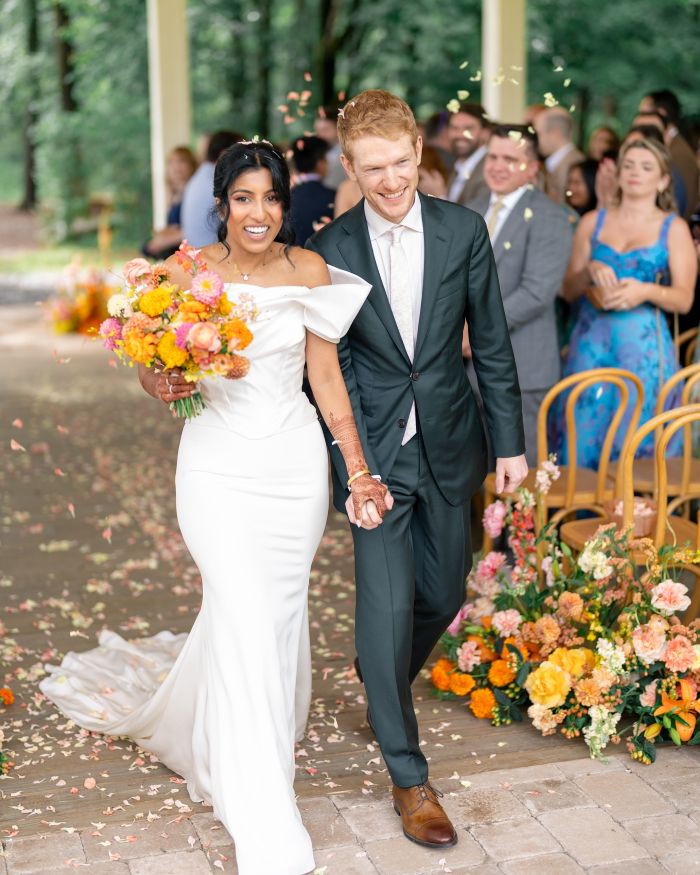
Photo by Paige Vaughn Photo
Destination Wedding Planning Checklist & Timeline
Now that we’ve walked through the key steps, here’s an at-a-glance checklist and timeline to help you stay organized and on track as you plan your destination wedding:
12 to 18 Months Out…
- Choose a location (this may involve planning a trip to your destination to tour and select a venue)
- Set your budget
- Hire a wedding planner
- Book your venue
- Build your guest list
- Check visa requirements & renew your passport (if necessary)
9 to 11 Months Out…
- Book your vendors (especially your caterer, photographer, and any large decor rentals such as tables and chairs)
- Send out save the dates
- Create your wedding website
- Set up a wedding room block at your venue or a nearby hotel
- Recruit your wedding party
- Purchase your dress and/or tux
- Plan & book wedding-related events (welcome dinner, group outings at your destination, etc.)
- Check marriage laws/requirements at your destination
6 to 8 Months Out…
- Book your rehearsal dinner venue (note that it is customary to invite all of your guests to your rehearsal dinner if you’re hosting a destination wedding)
- Work with your venue/caterer to decide your menu
- Order & send your wedding invitations
- Continue booking vendors (florist, hairstylist/makeup artist, cake maker, DJ, officiant)
3 to 5 Months Out…
- Book travel & transportation
- Complete dress/tux fittings & alterations
- Buy wedding rings & accessories
- Schedule recreational activities at your destination
- Book your honeymoon
- Keep track of guest RSVPs & meal choices
6 to 8 Weeks Out…
- Confirm ALL bookings & reservations
- Get the required vaccines for your destination
- Ensure you have all necessary legal documents (birth certificate, passport, visas, etc.)
- Buy gifts for the wedding party
- Order favors & welcome bag supplies for guests
3 to 5 Weeks Out…
- Build a seating chart & order a place/escort cards
- Mail any supplies you can’t pack to your on-site coordinator
- Have final wardrobe fittings
- Pick up your rings
- Make a list of any additional clothing/accessories you’ll need for your trip
- Make a plan for packing your dress/tux (do you need a special suitcase?)
1 to 2 Weeks Out…
- Pick up dress/tux
- Confirm travel plans
- Ensure you have the proper cash (in the right currency!) on-hand to tip vendors (if necessary)
4 to 5 Days Out…
- Pack your bags!
- Arrive at your destination (ideally 1-2 days before the bulk of your guests)
- Do a walk-through of your venue
- Meet with your coordinator and other vendors
- Apply for a marriage license (if doing so locally)
- Organize arrival bags for delivery to guests’ rooms
- Do hair & makeup trial
1 Day Out…
- Have dresses & suits steamed for the entire wedding party
- Enjoy your rehearsal & rehearsal dinner
Destination Wedding Packing List
The location is picked. The wedding is planned. Everyone is ready to go! Here is a destination wedding travel checklist to help get the essentials where they need to be.
Carry-On Packing List:
Avoid a wedding day disaster by keeping meaningful items in your possession while en route. Here’s what we recommend keeping with you as you fly:
- Wedding bands
- Sentimental jewelry
- Wedding dress
- Tux
- Medications/prescriptions
- Proof-of-vaccinations & Other health documents (if required by destination)
- Travel documents (passport, visa, accommodation information, etc.)
- Marriage license & other legal documents
- Foreign currency
Checked-Bag Packing List:
- Copies of all important documents
- Electrical adapters
- Clothes for downtime between wedding events
- Comfortable shoes for exploring your destination
- Sunblock & bug spray
Additional Travel Tips
- International travel often requires a set of healthcare precautions. Speak to your healthcare provider about the vaccinations that you may need before taking your trip.
- Prior to leaving, contact your cell phone provider to understand international phone plans. Will your phones work at your chosen destination? If you find that you are limited, download a texting app and establish meeting times and locations for all guests. Loop hotel reception into this information so they can assist your guests if needed.
- Alert your credit card company of your international travel. This will save you the headache of dealing with flagged transactions and restricted card use while you are traveling. Having the local currency on hand is also important for tipping or for cash-only situations.
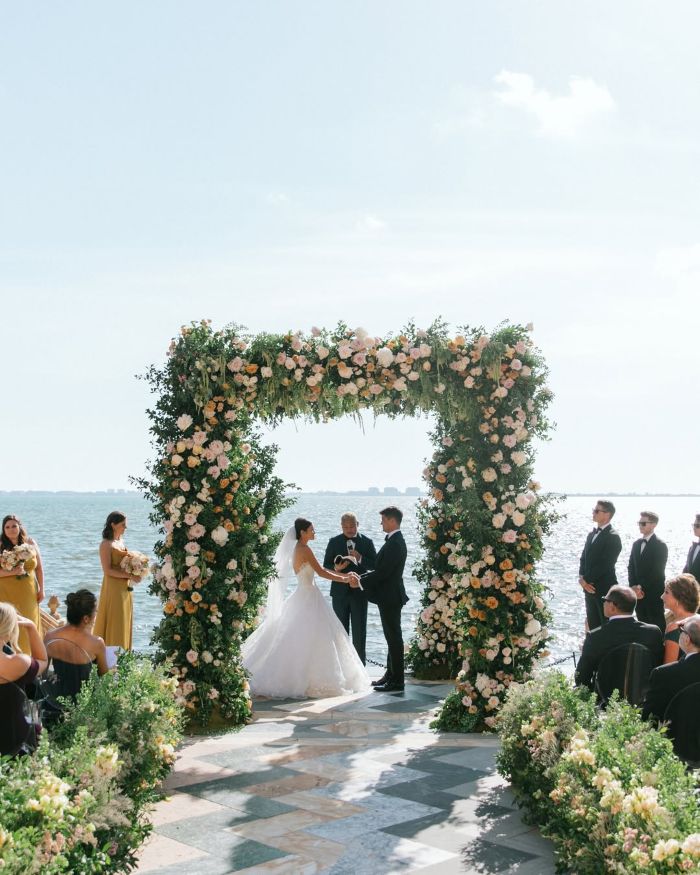
Photo by Julie Deffense
Destination wedding frequently asked questions (FAQs)
Planning a destination wedding often comes with a lot of questions. This section covers the most common concerns couples have, so you’ll feel more confident as you make your plans.
Is a destination wedding cheaper than a local wedding?
Destination weddings can be cheaper or equally expensive as a local wedding. As of 2022, it is estimated that the average destination wedding costs about $35,000, while the average local wedding costs about $27,000. That said, the average local wedding is larger than the average destination celebration, so cutting your guest list down can keep your destination wedding under budget.
Should I invite the same number of guests to a destination wedding?
Because destination weddings can be more expensive for guests to attend, couples should anticipate more of their invitees to decline their invitation. Normally, you can expect about 15% of invited guests to not be able to make a local wedding, whereas that percentage is typically closer to 50% for destination weddings. If you feel like it is important that all of your extended family and friends receive an invitation, you can extend one as a courtesy and expect a lower attendance rate.
When should I send the save-the-dates?
Give your guests plenty of time to plan travel by sending your save-the-dates 9 to 11 months before you plan to say “I do.”
Should the couple cover guest accommodations?
No, it is not expected that the couple cover the cost of guest accommodations. Ideally, you’ll be able to extend discounted room rates to guests who book within a block of rooms at your chosen hotel.
Do I need a wedding planner for a destination wedding?
It is highly recommended that you hire a local wedding planner for a destination wedding. Having a go-to person on the ground in your destination will help make navigating language barriers, negotiating with vendors, and understanding all of your options for your big day much easier than trying to piece it together yourself from afar. Many couples report that hiring a local wedding planner ultimately saved them money on their destination wedding in the long run, and allowed them to enjoy the process of planning their big day with as little stress as possible.
Will my marriage be valid in the U.S. if I get married in another country?
Generally, yes. Any marriage entered into between two U.S. citizens in another country is recognized as valid as long as the union was legal when and where it was performed. This means you’ll still need to get married legally in the U.S. before or after your destination wedding if you plan to host only a symbolic or religious ceremony.
Where do you get a marriage license?
If you plan to get legally married in the U.S. before (or after) your destination wedding, your marriage license can be obtained at your local county clerk’s office. If you plan to become legally married abroad, do research on the local laws of your destination to understand where you need to go to obtain a marriage license.
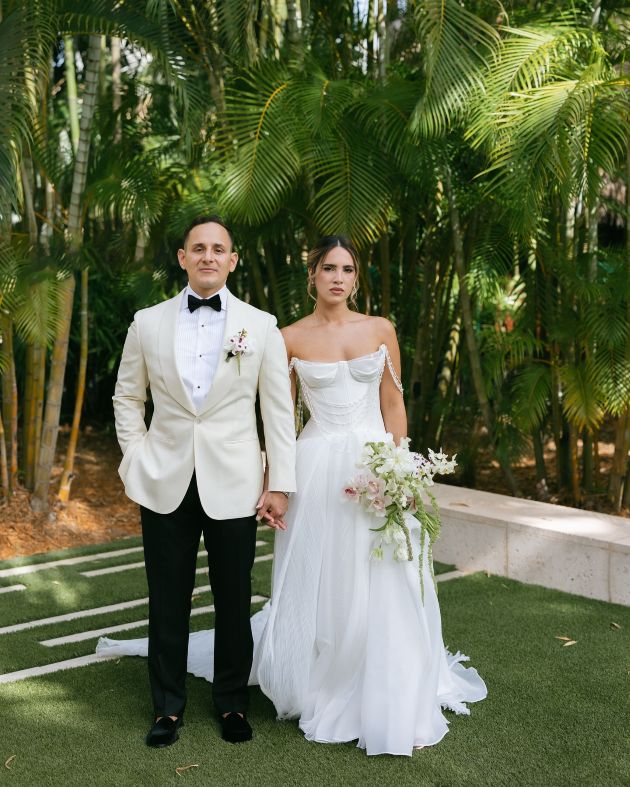
Photo by Brittney Alaina
What are the options for guests who can’t attend?
Options for guests who can’t attend a destination wedding include offering a livestream of your ceremony, planning a hybrid event with virtual components, or hosting a casual post-wedding reception back home so they can celebrate with you.
How do we handle unexpected emergencies abroad?
Handling unexpected emergencies abroad starts with preparation. Purchase travel insurance that covers cancellations and medical issues, keep a list of local emergency contacts, and ask your planner about backup vendors in case of last‑minute changes.
What’s the etiquette for guest costs?
The etiquette for guest costs at a destination wedding is that the couple typically covers the wedding-day expenses like food, drinks, and entertainment. In contrast, guests usually pay for their own travel and accommodations. To make things easier, consider negotiating hotel room blocks or offering group discounts, and communicate costs clearly on your wedding website.
Bringing Your Destination Wedding Vision Together
Planning a destination wedding is no small task, but with thoughtful preparation, it can become one of the most rewarding experiences of your life. Every detail you plan helps create memories you and your loved ones will cherish forever.
As you move forward, don’t forget that the right details can make your celebration feel uniquely yours. Explore Minted’s wedding collection for invitations, day‑of decor, and personalized stationery that will tie your destination wedding together beautifully.



